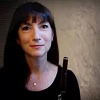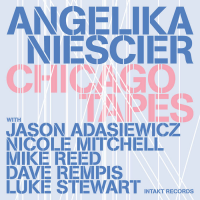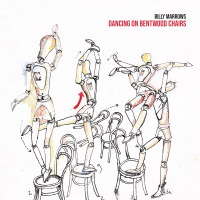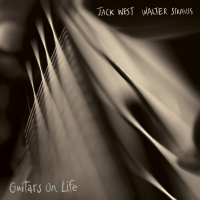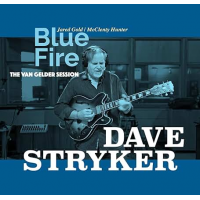Home » Jazz Articles » Album Review » Renee Rosnes: Crossing Paths
Renee Rosnes: Crossing Paths
She opens the curtain with "Frevo," grabbing the listener's ear with Egberto Gismonti's "wildly compelling athleticism," as she calls it, matching it with her own dazzling dexterity and that of her bandmates, the virile virtuosity of John Patitucci on electric bass, Adam Cruz's motivating drums, Chico Pinheiro's fleet guitar, Shelley Brown's glittering flute. As she put it, "you get pulled into a strong vortex of energy." In a multipart arrangement that still manages to come in under five minutes, she creates forward flow by setting the ensemble in diverse ways, enlivening the discourse with action-packed little interludes, tension-building send-offs, mercurial backgrounds, powerful ostinatos, textural contrast, pulsing unison, improvisatory counterpoint, colorful back-and-forth and subtle layering.
Wordless background singing—placed way down in the mix—is a signature feature of her arranging style, adding a fragility to the sound, a humanness. She frequently employs her own unadorned voice, and those of her ensemble members. A few notable examples are here. On Crossing Paths, she alters the mix, the band's voices moving into the foreground as they join Maucha Adnet in harmony on Antonio Carlos Jobim's "Canta, Canta Mais" (Sing, Sing More), affirming Vinicius De Moraes' lyric, that "quem canta o mal espanta" (who sings scares away evil). The coup, though, is Edu Lobo's "Pra Dizer Adeus" (To Say Goodbye), where she doubles her piano line. Rarely has she presented her voice as up-front and on-mic as she does here, creating a blended sound that is simply beautiful, responding to Lobo, who sings the lyric with an intimate tenderness. Torquato Neto's words are in Portuguese, but at the end, her piano—after a pregnant pause—seems to intone its own "goodbye" in English.
Lobo—whose "Casa Forte" is delightfully Rosnesized here as well—is one of two distinguished second-generation bossa nova composer-performers to contribute to Crossing Paths, singing their own compositions. Joyce Moreno offers the bittersweet "Essa Mulher," which Elis Regina introduced on Elis, Essa Mulher (Warner Brothers, 1979), a year before it appeared on Moreno's superb Feminina (Odeon, 1980). Moreno seems to turn the melody into one long sinewy line, which threads its way through Ana Terra's lyric, spinning the tale of a day in the complicated life of "this woman." Adnet, who sang with Jobim's Banda Nova for a decade, was in similarly strong voice for the date, negotiating leaps between registers with ease on his "Canta, Canta Mais" and sailing through "Caminhos Crusados." Lobo's vocal performance on "Casa Forte" and "Pra Dizer Adeus" is, likewise, subtly supple and genuine.
Beyond being a program of wonderful tunes in marvelous performances, there is a rich timbral depth to savor on this album, from Chris Potter's bodacious soprano on "Casa Forte" to Steve Davis' trombone and Rosnes' Rhodes on "Até o Fim" to Rogerio Boccato's multihued percussion. Like Duke Ellington and other preeminent jazz arranger-composers, Rosnes writes for her collaborators, framing their work to enhance its radiance, creating a greater whole.
Track Listing
Frevo; Pra Dizer Adeus (featuring Edu Lobo); Trilhos Urbanos; Canta, Canta Mais (featuring Maucha Adnet); Casa Forte (featuring Edu Lobo); Essa Mulher (featuring Joyce Moreno); Amor Até O Fim; Estórias da Floresta; Caminhos Cruzados (featuring Maucha Adnet).
Personnel
Renee Rosnes
pianoEdu Lobo
guitar and vocalsJoyce Moreno
vocalsMaucha Adnet
vocalsChris Potter
saxophone, tenorSteve Davis
tromboneChico Pinheiro
guitarJohn Patitucci
bassAdam Cruz
drumsRogerio Boccato
percussionShelley Brown
fluteAlbum information
Title: Crossing Paths | Year Released: 2024 | Record Label: Smoke Sessions Records
Tags
PREVIOUS / NEXT
Support All About Jazz
 All About Jazz has been a pillar of jazz since 1995, championing it as an art form and, more importantly, supporting the musicians who make it. Our enduring commitment has made "AAJ" one of the most culturally important websites of its kind, read by hundreds of thousands of fans, musicians and industry figures every month.
All About Jazz has been a pillar of jazz since 1995, championing it as an art form and, more importantly, supporting the musicians who make it. Our enduring commitment has made "AAJ" one of the most culturally important websites of its kind, read by hundreds of thousands of fans, musicians and industry figures every month.













